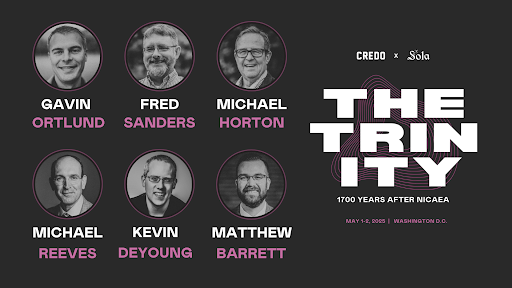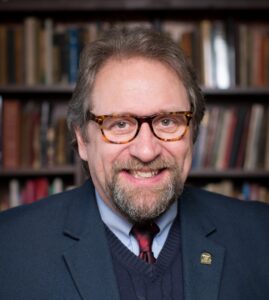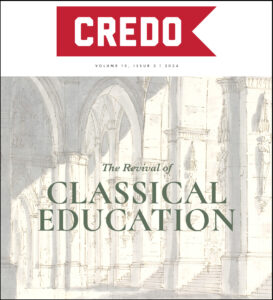G.K. Chesterton is famous for his wit, wisdom, and keen insight into culture and theology. What might be less known about Chesterton is his lasting impact on the revival of classical education. In this interview, Credo editor, Connor Shackelford asks Dale Ahlquist ten questions about the impact Chesterton has had on his life and the life of the school Ahlquist founded, Chesterton Academy. Dr. Ahlquist is a Chesterton scholar and founder of both the Chesterton Society and Chesterton Academy. In this interview, he reminds us why Chesterton is a model thinker for the Christian, and why parents should seek to give their children the kind of education that will instill in them not only knowledge, but virtue and maybe just a little bit of wit.
What work by G.K. Chesterton has had the biggest impact on your life?
I suppose the answer has to be The Everlasting Man, which was the first GKC book I read and thereby paved the way for all the other works I’ve read. I’m sure I did not understand even half of that book the first time through, but I knew I wanted more Chesterton. I had an instant passion for his wit, common sense, and mystical insight into eternal truth. That passion has never ceased.
Why name a school network centered around classical education after G.K. Chesterton?
G.K. Chesterton is a model thinker, but in one of my books on him I also call him “The Complete Thinker.” What we try to do with classical education is create complete thinkers. It is done with an integrated curriculum supported by the three pillars of truth, goodness, and beauty. With Christian Classical Education, that Truth is Jesus Christ. If Christianity is true, it is relevant to all other subjects.
How have you seen the landscape of education change over the past 10 years or so?
Covid ripped the cover off most schools, public and private. Parents were horrified to see how little their children were actually learning (and how bad the subject matter was that they actually were learning.) There were already rumblings from parents who wanted a change. Now there was an explosion. They actively sought a true alternative to the progressive educational system that was obsessed with fashionable trends rather than traditional truth and basic academic skills. Many have turned to a classical education model because it yields such positive results.
Should we encourage students to write creatively as Chesterton did?
We should encourage students to read Chesterton and their writing will naturally improve. What we try to do with classical education is create complete thinkers. Share on X
If you could change one thing about your own educational upbringing, what would it be and why?
Even though I had a good education in terms of learning the skills of reading, writing, and arithmetic, I was never exposed to philosophy and to most of classical literature. I have now had the great privilege of creating the kind of school that I wish I could have attended.
I certainly wish I’d read more. I developed my love of books far too late. I realize sadly that there are certain books I will simply never get to. And I really regret not sticking to Latin a lot longer!
Why should parents enroll their children in a classical education program?
For the simple reason that most public schools (and the private schools that simply use the same model but charge a lot of money for it) will probably ruin their minds and souls. There is nothing more important than the minds and souls of your children. There is nothing more important than the minds and souls of your children. Share on X
What was the most challenging part of starting the Chesterton Academies? What has been the most rewarding part?
We had planned to start only one school and we were willing to start small. We put together a good curriculum and found some pioneering parents and teachers who were drawn to what we were offering. We started seeing good results very quickly. Then people from other places found out about it and they came to us and said they wanted to do the same thing. The challenge was putting the curriculum and the templates into a format that others could implement. Once we were able to do that, the Chesterton Schools Network really started to grow. In ten years, we’ve seen over 60 new schools open with at least thirty more in the pipeline. Now the challenge is to make sure no one messes with the model. The reward is to see young lives transformed for the good and parents whose gratitude is immeasurable.
Other than Chesterton, who has been the most influential author in your life?
Sorry. While my favorite writer does not change, my second favorite has changed many times depending on where I was on my journey. The shortlist includes C.S. Lewis, Kierkegaard, Dostoyevsky, and Peter Kreeft.
Why did you settle on “Cultura Vitae” as the school network’s motto?
It means “Culture of Life.” It was a direct response to the phrase used by Pope John Paul II to describe our age as the Culture of Death. Modern culture strives for lifeless things: abortion, barrenness, and sexual perversion. It defends these things as normal. At the Chesterton Academies, we form students who represent a counter-revolution. Our schools are not only filled with life, they are filled with joy. At the Chesterton Academies, we form students who represent a counter-revolution. Our schools are not only filled with life, they are filled with joy. Share on X
How would you define “common sense?” And why is it so needed today?
I will let G.K. Chesterton define it. “A sense of reality common to all.” Or, “The power of getting a general grasp of the tendencies of human experience as a whole.” And here’s another: “The power of preserving our real impressions undistorted and intact.” And, very succinctly: “An instinct for the probable.”
The academic world today is at war with common sense, finding new and ever more absurd ways to promote uncommon nonsense. Chesterton remains a refreshing and reinvigorating antidote.
Readers may learn more about Dr. Dale Ahlquist and the work of the Society of Gilbert Keith Chesterton at chesterton.org and chestertonschoolsnetwork.org
Photo Credit: The Society of G.K. Chesterton



